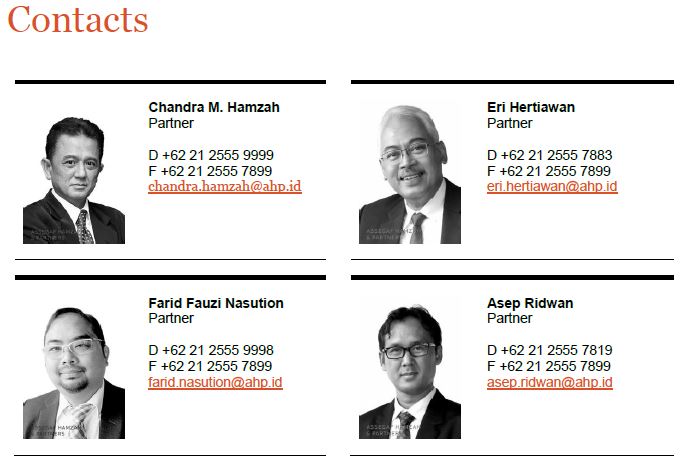Drastic Changes regarding Appeal against KPPU Decision
Last Friday, the Supreme Court issued the Supreme Court Regulation No. 3 of 2019 on Procedure for Appeal against Decisions of the Indonesian Competition Commission (“KPPU“) (“Regulation“) dated 9 August 2019. This new Regulation provides several drastic changes that can limit business actors in presenting their appeal against KPPU decisions.
Below are the key changes under the Regulation:
- Electronic filing
Under the Regulation, appeal against a KPPU decision can now be submitted online. This mechanism is in line with the new Supreme Court regulation on electronic litigation.
- Change to deadline to file an appeal
Under the previous regulation, an appeal against a KPPU decision can be filed to a district court within 14 business days as of receipt of notification of KPPU decision or as of the date of announcement of the KPPU decision through KPPU’s website. Such deadline is applicable regardless of whether the appellant attended the hearing decision or not.
Now, an appellant has 14 business days to file an appeal to a district court, and the 14-day period will be calculated as of:
- the date of the hearing decision, if attended by the appellant; or
- the date of the notification of the KPPU decision if the appellant did not attend the hearing.
- Additional administrative requirementsThe Regulation explicitly requires an appellant to submit the following documents to the district court in filing an appeal:
- a power of attorney;
- a request for appeal; and
- a copy of the KPPU decision.
If these documents are not provided, the district court will return the filing to the appellant. For comparison, the submission of a power of attorney and a request for appeal was not explicitly stipulated under the previous regulation but were required by the district court.
- Shorter period for consolidation of appeals
According to the Indonesian Competition Law, an appeal to the district court must be filed to the district court whose jurisdiction covers the domicile of the appellant. This procedure may result in multiple appeal filings against one KPPU decision in different district courts if there were more than one appellant.
In the previous regulation, KPPU would submit a written request to the Supreme Court to consolidate the appeals and appoint one district court to examine the appeal. The Supreme Court must conclude such consolidation and appoint the district court within 14 business days after receiving the KPPU’s written request. This deadline has now been shortened under the new Regulation, which provides that the Supreme Court must appoint the district court within 7 working days after receiving the KPPU’s written request.
- No possibility of additional examination
Under the previous regulation, the panel of judges, which are the adjudicating judges in the district court, can instruct the KPPU to hold an additional examination if deemed necessary. In practice, the appellant can also propose such additional examination to the panel of judges.
The new Regulation, however, is silent on this. This can mean that additional examinations will no longer be allowed under the new Regulation. It remains to be seen how this provision will be applied in district courts.
- No possibility of civil review against the Supreme Court decisions
Article 15 of the new Regulation stipulates that both the appellant and the KPPU can only file an appeal to the Supreme Court as the last legal measure against a district court’s decision. This is in contrast to the previous regulation, which was silent on this issue, but in practice, the Supreme Court accepts civil reviews against the Supreme Court decision. This can also mean that civil review against the Supreme Court decisions will no longer be allowed under the new Regulation.
In conclusion, it remains to be seen how the Regulation would apply in practice, especially bearing in mind the drastic changes implemented by some of the provisions. However, please note that in order to provide legal assurance, the previous regulation remains applicable for any ongoing appeal to the district court until such appeal has obtained a final and binding decision.

***
AHP Client Alert is a publication of Assegaf Hamzah & Partners. It brings an overview of selected Indonesian laws and regulations to the attention of clients but is not intended to be viewed or relied upon as legal advice. Clients should seek advice of qualified Indonesian legal practitioners with respect to the precise effect of the laws and regulations referred to in AHP Client Alert. Whilst care has been taken in the preparation of AHP Client Alert, no warranty is given as to the accuracy of the information it contains and no liability is accepted for any statement, opinion, error or omission.

